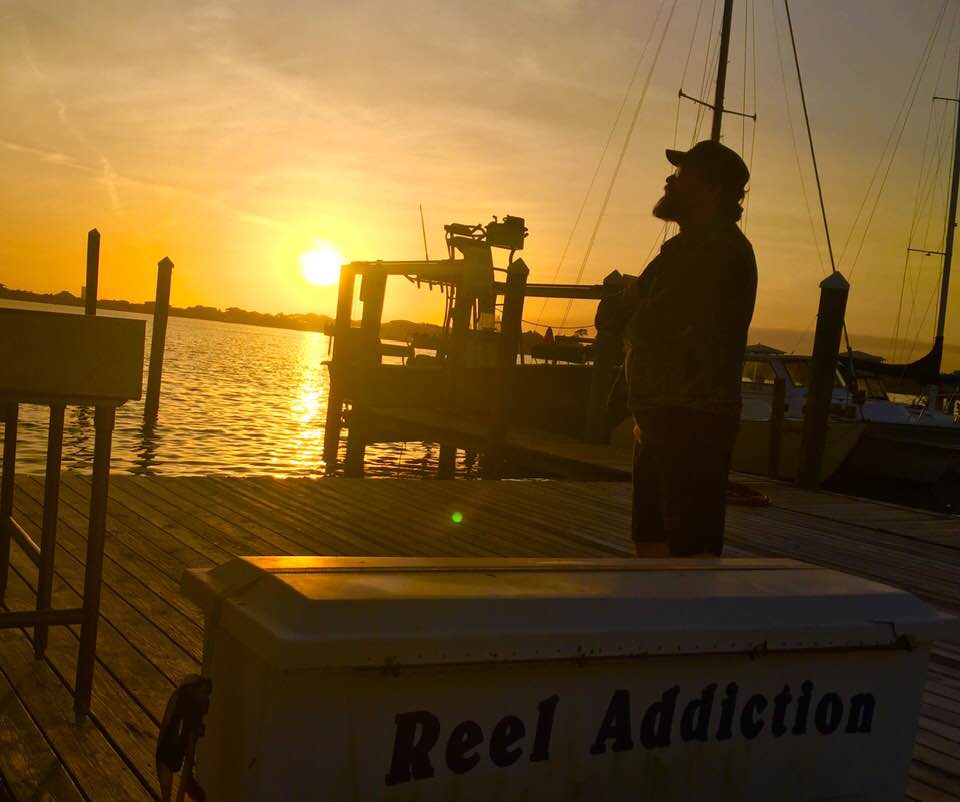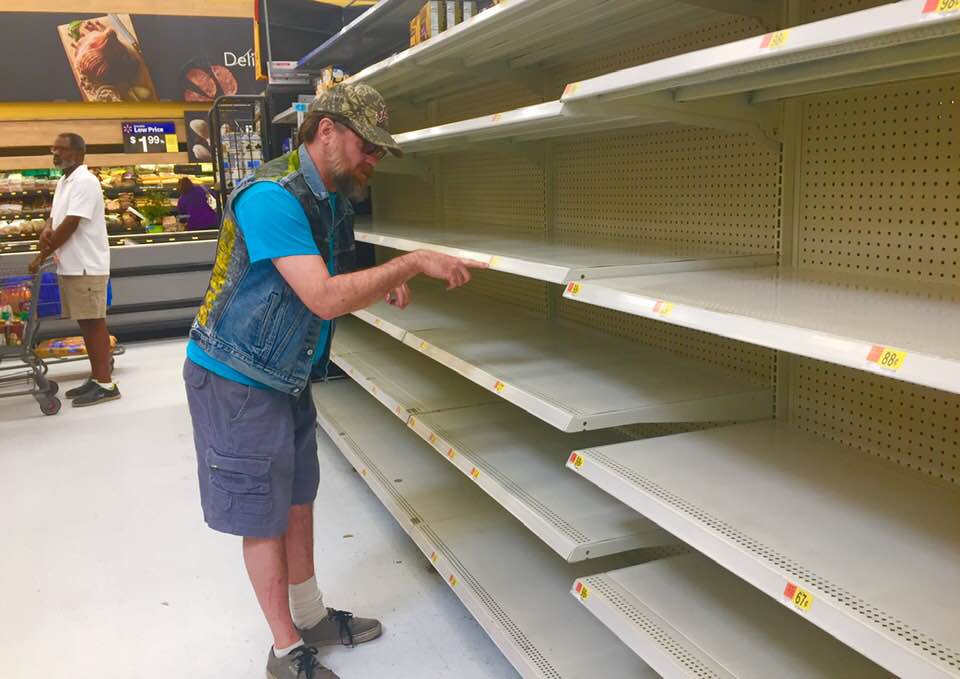The Big Picture -Â
By Glynn Wilson -Â
PENSACOLA, Fla. — This feels surreal, but reality is beginning to set in.
It feels like Murphy’s law is in full effect: “Anything that can go wrong will go wrong.”
As the novel coronavirus health pandemic continues to grow, and a global economic recession and maybe a depression now seems inevitable, it really is feeling a little bit like the end of the world, at least as we know it.
When we decided to head over the bridge to check out the level of crowds heading to Spring Break on Thursday, it felt a little bit like viewing the end of the world from the edge of the world.
Coronavirus Hits Gulf Coast Just In Time for Spring Break
But at that point, the Trump administration and Republicans in Alabama were still denying reality, acting like nothing serious was wrong and urging people not to worry.
But all that changed on Friday, as President Donald Trump himself finally declared a national emergency and changed his tune on his own exposure to the virus, saying he would submit to a test and undergo a 17 day quarantine at one of his golf courses.
In Alabama, by late Friday afternoon, Republican Governor Kay Ivey had followed Trump’s lead and also declared a state of emergency as a number of cases finally began to show up in the state, even with the limited testing allowed under serious restrictions, to those who traveled to hotspot countries or had direct exposure to someone who tested positive.
When we played the last set at the Northwest Florida Blues Society blues jam at Seville Quarter Monday night, and still in the afternoon on Thursday at the beach, people we encountered seemed sanguine that they would not be seriously affected by the situation.
“It’s all a bunch of media hype,” we heard from several people we interviewed informally.
Friday
But by Friday afternoon, after the president and governors gave people permission to panic, people rushed out to buy up all the bread, milk, bleach and toilet paper they could find. By Saturday afternoon, the Walmart in Milton, Florida had aisles of empty shelves, but we managed to stock up on canned beans, rice and beer.
If it’s going to be an end of the world party, we’re going to be ready. We even have bugout contingencies already in place.
Sunday
By Sunday morning, Trump’s doctor was claiming he tested negative for the virus. But considering his well proven propensity to lie about everything, most people were not convinced.
White House Doctor Claims Trump Tested Negative for COVID-19 But We Have No Reason to Believe Him
As usual, Trump’s plight seemed like a huge distraction to what the Washington Post is already calling “the most abrupt and widespread cessation of economic activity in (U.S.) history,” which has us “hurtling toward a recession that could mean lost jobs, income and wealth for millions of Americans.”
Empty shelves aside, consumer spending is “grinding to a halt as fears of the escalating coronavirus pandemic keep people from stores, restaurants, movie theaters and workplaces.”
The rapid national shutdown “already has caused layoffs and reverberated on Wall Street, driving stocks into their first bear market in 11 years.”
This feels way worse than the Bush Great Recession in 2007-2009, however, that we didn’t even find out about until the numbers came in in 2008. This novel coronavirus recession you can see on cable or broadcast TV as it happens, even if you don’t venture out onto empty roads and abandoned beaches.
Experts are beginning to say this epidemic and economic slowdown is on the verge of becoming way worse, and even harder to fight.
“The problem is everyone in America is cutting back their consumption,†said Jason Furman, who led the Council of Economic Advisers during the Obama administration. “A lot of sectors are being hit, especially the services sector. A lot of income and spending is being reduced. That’s just an enormous shock to the economy.â€
The modern economy has weathered recessions and shocks before, from natural disasters and terrorist attacks.
“But what’s different this time is the speed of decline and the comprehensive economic hit caused by an unpredictable health scare that interferes with Americans’ ability to produce and consume,” according to the Post.
By the end of March, the global economy is projected to shrink by 1.2 percent, just short of the 1.6 percent drop in the fourth quarter of 2008, when banks were on the verge of failing, only saved by the Bush and Obama bailouts.
“This is like a hurricane happening everywhere simultaneously for months and months on end,†Furman said.
The economic costs are showing up fast, even with the press and media itself.
Even “CBS Sunday Morning” had to run re-runs, since the CBS News headquarters in New York was closed after workers tested positive. “Face The Nation” went on from the Washington bureau. Many news outlets told reporters to work from home.
Even the gambling business is being hit. While MGM Resorts in Las Vegas announced positive cases and layoffs, Wind Creek casinos in Atmore, Wetumpka and Montgomery, Alabama, also closed down for at least 24 hours after a visitor tested positive. It’s even going to be hard to gamble your dwindling retirement plan proceeds away.
You can pray, but churches are canceling services.
Bars and restaurants are going to be hit hard, as customers are going to be reluctant to go out.
Apple has closed all stores outside of China until at least March 27.
The auto industry is going to be hard hit, and more than 18 million Americans work in industries that are being effected by efforts to contain the virus, including travel and tourism. Music concerts and sports events are being canceled, including the NBA season. College football is being closed down as spring practice games are being canceled, even in Roll Tide-War Eagle Alabama.
The Smithsonian museums in Washington, D.C. are closed, and even if you wanted to travel, planes and trains are being taken out of service and some hotels are even closing their doors. Delta led the news by shutting down 40 percent of its flights.
“The speed of the demand falloff is unlike anything we’ve seen — and we’ve seen a lot in our business,†Ed Bastian, Delta’s chief executive, wrote in a note to employees.
JPMorgan Chase is projecting a depression to the tune of $2 trillion of economic activity lost for at least three months, longer if the virus does not dissipate by summer. While flu season tends to dissipate as the heat comes up, there is no data on how this COVID-19 strain will react.
So Much for the Best Ever Economy
The U.S. economy that President Trump hailed in January as “the best it has ever been†will be smaller at the end of June than it was on New Year’s Day, according to projections.
“If we don’t change the trajectory, we are certainly headed for a worse outcome than officials are indicating,†said Simon Johnson, the International Monetary Fund’s chief economist in 2008. “We’ve never experienced a shock like this.â€
Companies are drawing down their bank credit lines, but so far there is no indication that other major things could go wrong, like ATMs not working or the power grid, water and sewer systems going down.
Linda Schreiber, owner of travel agency Starship Travel outside Chicago, said fear of contracting the virus had resulted in many cancellations of spring break trips, graduations and destination weddings.
“It’s horrible timing for this to happen,†she said. “People are canceling left and right.â€
Stocks and bonds are taking a hit, and an oil price war between Saudi Arabia and Russia is driving the price of oil and gas down, even as people are driving less. Presumably trucks delivering goods to stores will continue to roll, so some companies could benefit from lower gas prices.
“We’ll see a huge surge in oil supply over the next few weeks and no demand for it,” said Francisco Blanch, head of commodities and derivatives research at Bank of America. “We think the price will dip into the $20 range and could even touch the teens.â€
At those prices, the shale oil and gas boom in the U.S. is in serious jeopardy, which might actually help the climate in the short term.
National Emergency
But in his announcement of a national emergency on Friday, Trump said the federal government would buy oil on the open market to fill the nation’s strategic reserves, and to prop up the price.
Stock traders are said to be watching for signs that energy companies may default on debts, which would batter regional banks in Texas and Oklahoma and hit the $10 trillion bond market.
Medicaid and Food Stamps
Meanwhile, Trump had been trying to cut off poor people from food stamps and Medicaid, but the House passed a bill this week to boost spending to protect the poor, which will have to pass the Senate at some point although it was in recess this week, and U.S. District Judge Beryl Howell ruled Friday that Trump’s proposed change to force unemployed adults without children off the welfare rolls unlawful and blocked the move.
“Especially now, as a global pandemic poses widespread health risks, guaranteeing that government officials at both the federal and state levels have flexibility to address the nutritional needs of residents and ensure their well-being through programs like SNAP, is essential,†she wrote in her ruling in a lawsuit brought by 19 states, the District of Columbia and New York City.
“This is a major victory for our country’s most vulnerable residents who rely on SNAP to eat,†D.C. Attorney General Karl A. Racine said in a statement. “The Trump administration’s rule would have forced hundreds of thousands of people who could not find work, including 13,000 District residents, to go hungry. That could have been catastrophic in the midst of our current public health emergency.â€
Alabama
In Alabama, like the rest of the nation and the world, the impending health and economic disaster is starting to hit home.
Because Republicans in the state followed Trump’s lead in downplaying the threat for the past couple of weeks, and stood by while 18 rural hospitals closed because the state refused to expand Medicaid for political purposes, the state lacks the resources, hospital beds, respirators and test kits to treat all those who will need help, even if they could afford to pay for it or have private insurance.
“Folks, the virus is here,†UAB infectious disease specialist Dr. Michael Saag wrote in an open letter to Alabamians on Friday. “The clock is ticking on how we, as a community, respond. If we wait too much longer, our healthcare system will become destabilized from the onslaught of cases.â€
He compared the crisis to a weather disaster.
“Returning to a meteorological metaphor, we currently have a ‘hook echo’ on the radar screen,†he wrote. “The tornado is already touching down. It’s time for us to get to our ‘safe places to minimize destruction of our healthcare infrastructure and loss of life.â€
Florida
In the Florida Panhandle, the Pensacola News Journal is doing like the New York Times and other online newspapers and lifting its paywall to make information about the novel coronavirus available for free. This list of business and event closures is nearly mind boggling.
Coronavirus cancellations: Here’s a list of Pensacola area events, activities canceled/rescheduled















